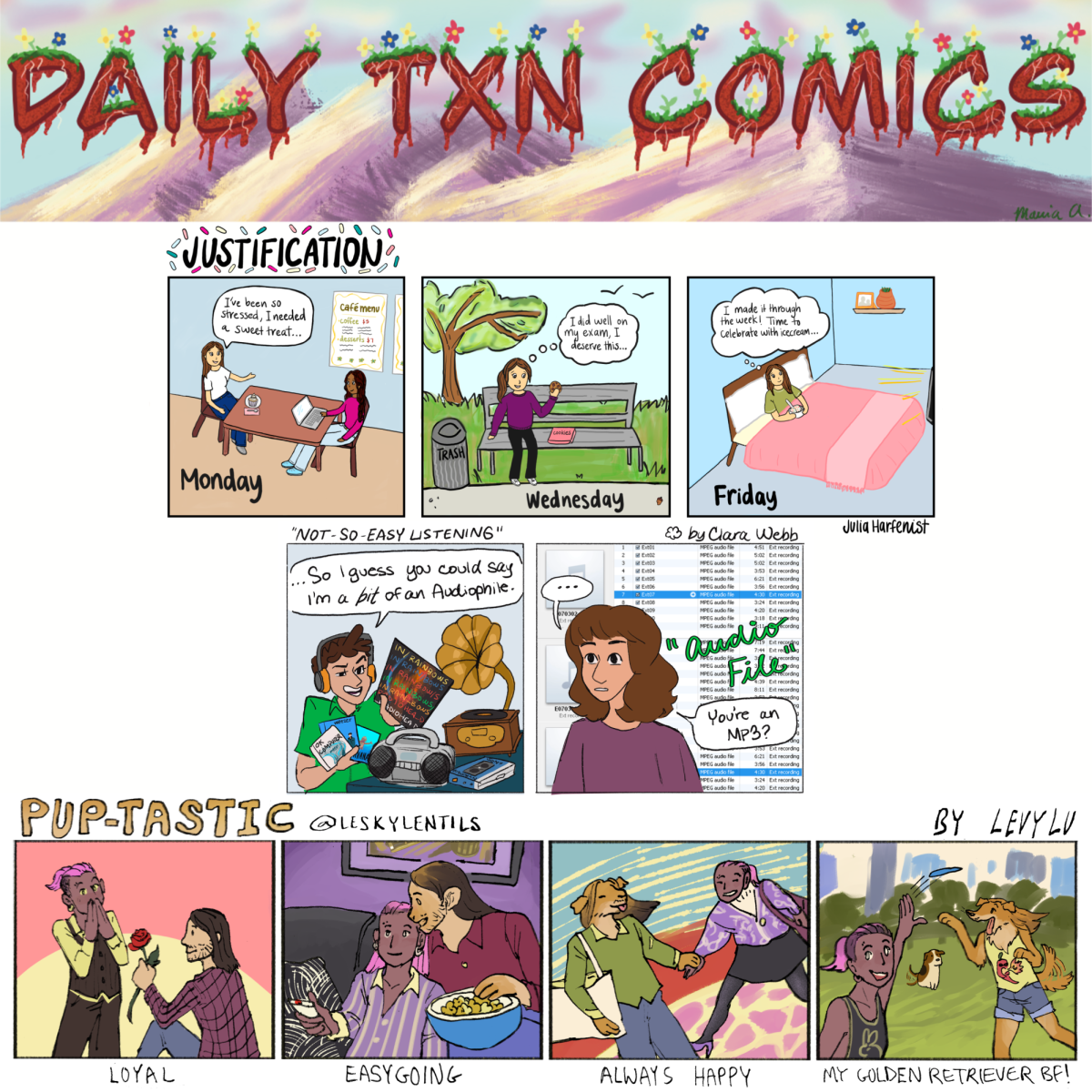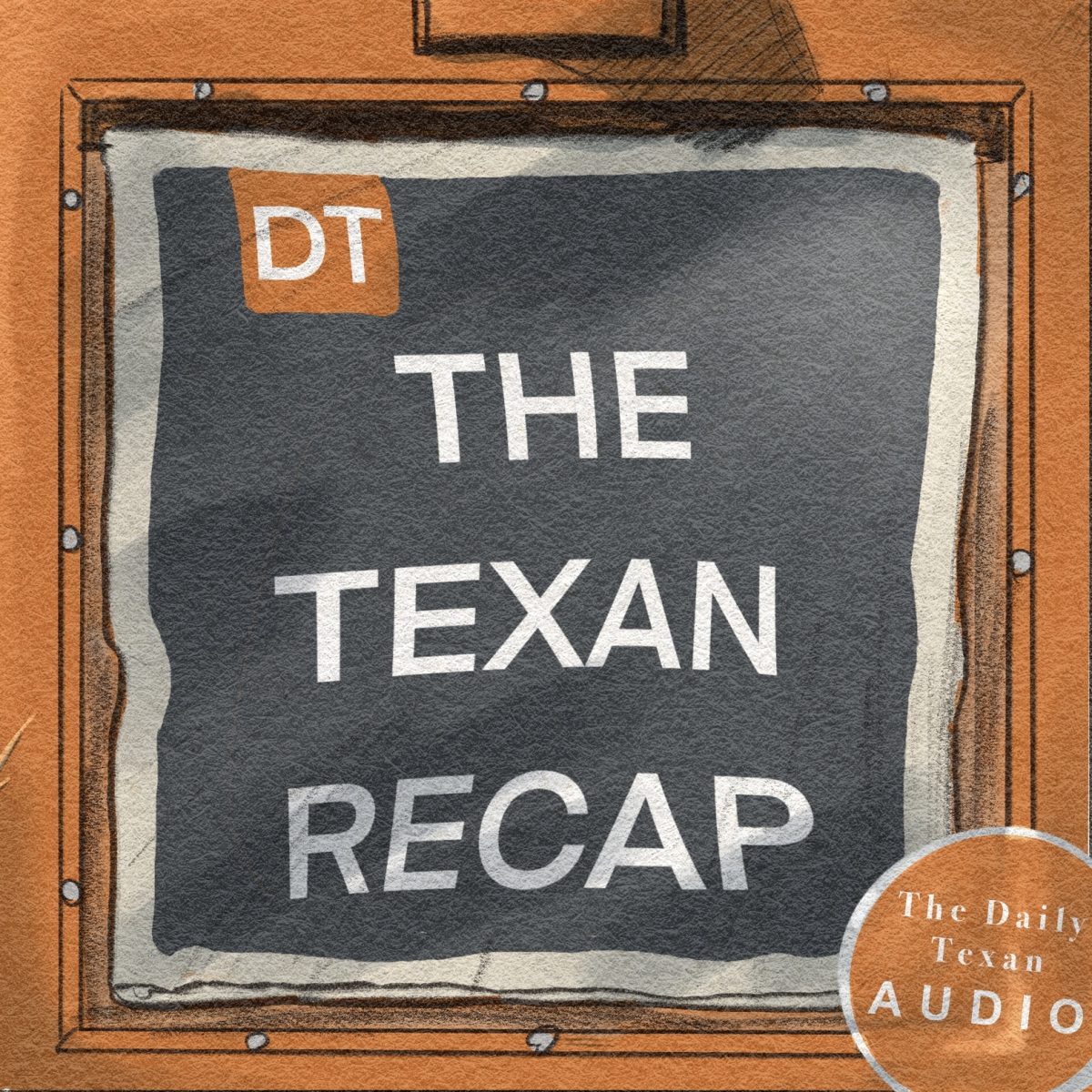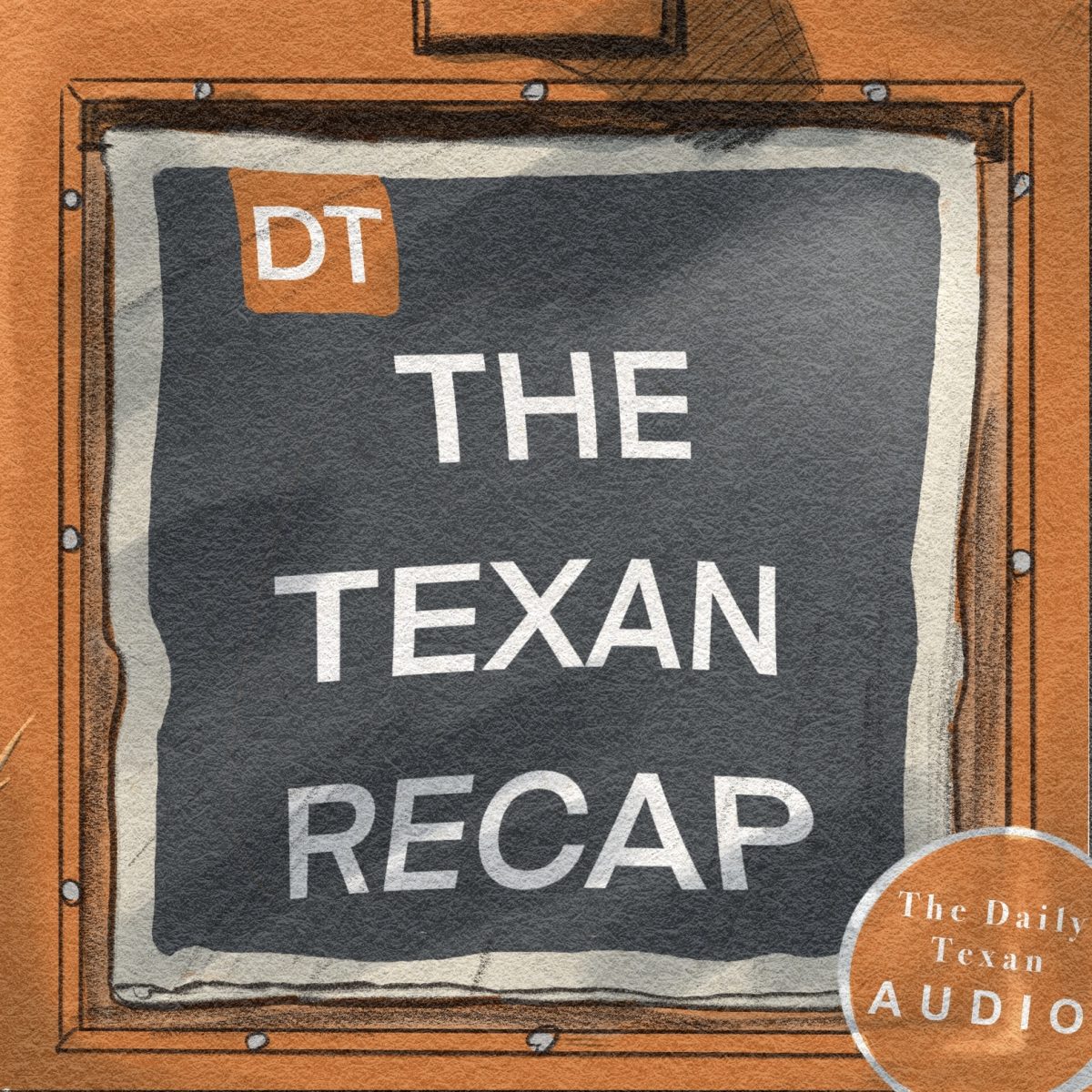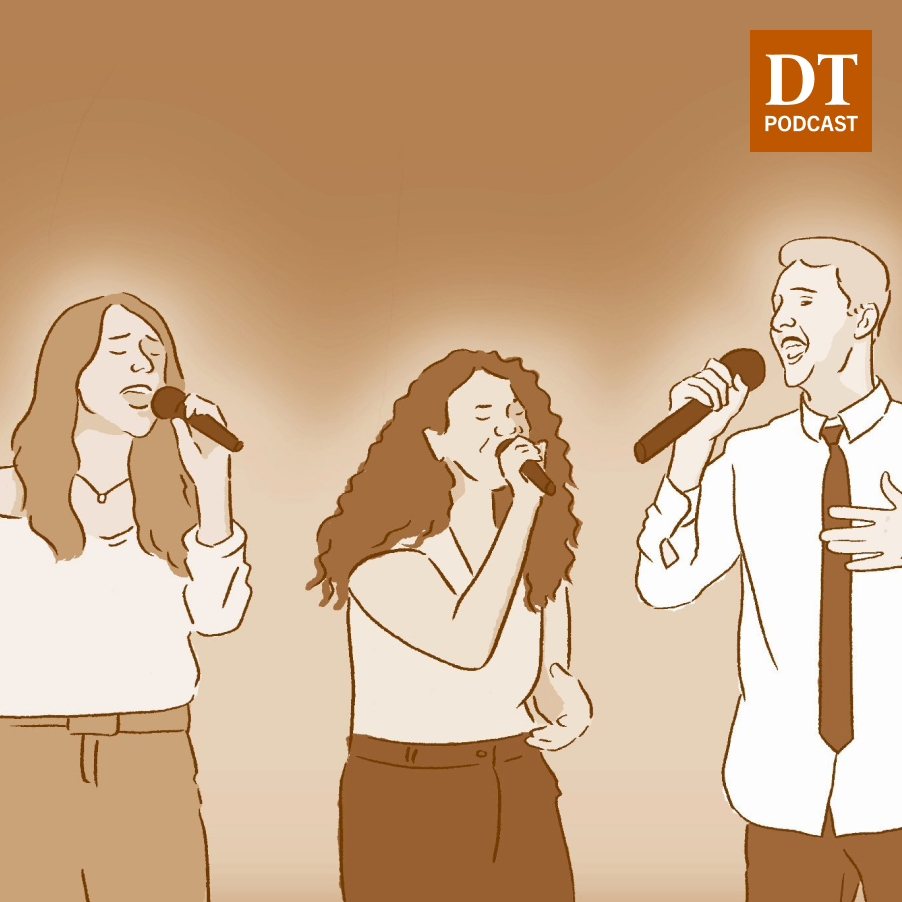In this episode of the weekly recap, audio editor Aislyn Gaddis talks with Texan reporters about The Friendly Rio Market, a corner store that doubles as a music venue, and Hole in the Wall, a historical music venue that just secured a 20-year lease. Plus, a 100-year-old pecan tree at Barton Springs might have to be removed because of a fungal infection.
Reported by Diego Saldana, Kylee Howard and Sarah Brager. Hosted and produced by Aislyn Gaddis. Cover art by Emma Berke. Music by Top Flow Productions
*upbeat music*
Aislyn Gaddis: A west campus corner store that doubles as a music venue and a 100-year-old pecan tree at risk because of fungal infection.
I’m your host this week, Aislyn Gaddis and this is The Texan Recap.
Plus, the historical music venue and bar, Hole in the Wall, just secured a 20-year lease.
Here’s what you missed this week.
*upbeat music*
Aislyn: The Friendly Rio Market at the intersection of 29th and Rio Grande might look like just a regular corner store, but come back on a Friday night and you’ll see a line out the door. Life & Arts General Reporter Diego Saldana is here to tell us more. Diego, thanks for joining me.
Diego Saldana: Hey, thanks so much for having me.
Aislyn: So, the Friendly Rio Market is a corner store and a music venue. How does that work?
Diego: Well, uh, I found that it works in two ways, actually. Um, and the first would be in a physical sense and the second, a communal sense. Uh, physically it works by moving like the middle, two middle aisles of the store and that creates just enough space to set up a drum kit and have a guitar and a bass amp on each side.
It’s kind of lined up to where it’s in the center of the store. That makes it like those three, that’s three people for one band set up in the middle of that store. And, it’s a little squished. So, if you’re having like four or five members in one band, it’s definitely a squeeze.
Um, but there’s still enough space for customers to shop two of the aisles that will still be set up in there and have access to the drinks that line the walls and the back of the store. So that’s how it physically works. Communally the store works, uh, perfect as a corner store and music venue.
By having a customer base because of its prime location, uh, centered in like the heart of West and North campus. It already has those customers that know about the store. Through shopping there, they find out about its doubling as a music venue. It turns it from just a corner store into a communal place for locals to congregate, and they can listen to some music without leaving far from their home.
Aislyn: So how often do they have these shows?
Diego: Um, yeah, so they have these shows every Friday, 7 to 10 PM, and on some weekends on Saturdays. Although, during South by Southwest, they’ll function as like a traditional music venue and have shows throughout the week and sometimes a few a day. And so people just love that idea. They love the idea that a random place can be transformed into a nontraditional music venue. And what better place to do it than Austin? Like the live music capital of the world.
Aislyn: Does it cost anything to attend?
Diego: Actually, no. Uh, that’s one of the best, uh, qualities of the Rio Mart experience is that it’s completely free.
Often customers will come in for a snack or a drink and end up hanging out for a bit because there is free music. You are in a corner store so the concessions are right there for you. Although there’s not a fee, you can kind of pay it back by buying something there or just hanging out.
I found that the people I’ve talked to who go there just started attending there more frequently because they hold these events.
Aislyn: How does it serve as sort of a more accessible music venue?
Diego: So the Friendly Rio Mart makes itself a more accessible music venue first by making every show an all-ages event. Secondly, being free of charge. Third and most importantly, is that it’s really just a lighthearted environment that it creates.
You know, it’s, it’s a change from a traditional music venue. In a bar or a club, uh, where the scene can sometimes be intimidating. It’s a place where your parents or grandparents might not, uh, mind stopping in, to watch somebody play, for younger audiences too, that wouldn’t be able to get into a club or a bar, uh, it’s perfect for them.
Most importantly, it’s that like the ambiance created by being inside of a corner store, and watching the show just makes it really fun. There’s a lot less pressure for the band and for the audience and that makes it easier just to have a good time on a Friday night.
Aislyn: Finally, one of the bands you spoke to said something really interesting about the booking process. Could you tell me about that?
Diego: Definitely. So the band I talked to, called Farmer’s Life. It’s a local band here in Austin and local campus band. Uh, they said that in their experience, they booked their show simply by DMing Rio Venue’s Instagram account. So they were trying to schedule a show sooner than later at that point.
And they received a response that the venue was actually booked out for months ahead. This was really wild cause like they weren’t expecting for a nontraditional place to have a wait that long and being. Being booked ahead for months is basically, it’s almost on the same level as like established and traditional music venues.
Say like the Mohawk or Stubbs or somewhere like that where you would find on like the Red River Strip that houses a bunch of notorious and really big, uh, music venues.
Aislyn: That was General Life and Arts reporter Diego Saldana. Diego, thanks so much for joining us.
Diego: Thanks so much for having me.
*upbeat music*
Aislyn: A 100-year-old pecan tree at Barton Springs is at risk for removal because of a fungal infection.
The tree, named Flo, has been a fixture at Barton Springs Pool since it survived a catastrophic flood in 1935.
The fungus is known to cause structural issues, and Flo has already been struggling with age and drought, which is why she might have to be removed
The city did say they are still exploring other options to preserve Flo and that final consultations should be finished soon.
This story was reported on for the Texan by News Desk Editor Kylee Howard.
*upbeat music*
Aislyn: Hole in the Wall, a historic music venue and bar near the University of Texas at Austin, just secured a 20-year lease. Senior news reporter, Sarah Brager, is here to tell us more. Sarah, thanks for joining me.
Sarah Brager: Of course, thanks for having me.
Aislyn: So, for people who may be unfamiliar, can you tell me a little bit about Hole in the Wall?
Sarah: Yeah, so Hole in the Wall is a music venue and bar located just right off UT’s campus on Guad. And it’s of course a popular spot for UT students to go, but it also attracts generations of music lovers from around Austin because it’s been open since 1974. Um, so if you go into the Hole in the Wall, it’s likely you’ll meet someone who’s been coming very regularly for decades.
The venue is known for showcasing local bands and musicians every day, many of whom who have gone on to have great music careers. And I know many students appreciate, you know, having a venue so close because a lot of students that are in bands may get the chance to perform there or play a set there at some point.
Aislyn: 20 years is a really long time. How did they get a lease this long?
Sarah: Yeah, so it was quite a lengthy process. They had to…the, the Austin Economic Development Corporation partnered with the owner of the Hole in the Wall, Will Tanner, and the venue operator to secure the lease after Hole in the Wall applied for assistance through something called the Austin Cultural Trust, which is an initiative by AEDC to promote stabilization of the arts in Austin.
So after AEDC reviewed the applications, they were able to designate 1. 6 million from the city’s Iconic Venue Fund to Hole in the Wall so they could set up a 10-year lease with two 5-year extensions. And, prior to receiving this assistance, Hole in the Wall was operating month to month, so the Iconic Venue Fund investment was really a relief for a lot of the staff and the customers.
Aislyn: Why is this lease important not only for Hole in the Wall but other music venues as well?
Sarah: So this is actually the first iconic venue investment from the city, so it kind of sets an example of how the city can potentially support old venues that are threatened by displacement, as Hole in the Wall was.
Renting is expensive in Austin, especially on Guad, so a lot of local businesses are finding it more difficult to stay open. There were initially about 45 applicants for the Austin Cultural Trust. So it’s expected that the city will continue to work with the businesses and establishments in need that the city has the means to support in the future.
Aislyn: Talking to people for this story, what did you learn about why people love Hole in the Wall? Like, what makes it special?
Yeah, the, the people I spoke to for this story all agreed that the history and the artistic culture of the Hole in the Wall is what makes the venue so special to them. Um, J. D., a door attendant who I spoke to for this story, described it as a place operated by musicians for musicians, so there’s kind of a connection.
Between the employees and the people who visit. Um, a regular who I spoke to at the venue, she described Hole in the Wall as having a sort of magic to it that lingers in the walls. And like I said before, people have been coming to Hole in the Wall for decades, so there’s definitely something about it that draws Austenites, both old and young, through the doors.
Aislyn: That was senior news reporter Sarah Brager. Sarah, thanks so much for being here.
Sarah: Of course, happy to be here.
Aislyn: And that’s The Texan Recap for the week of Aug 28…I’m Aislyn Gaddis
*upbeat music*
Aislyn: This episode was a production of The Daily Texan Audio Department. Hosted and produced by me, Aislyn Gaddis. Special thanks to Diego Saldana, Kylee Howard and Sarah Brager for their reporting, and to Katy Nelson, Mimi Calzada, and Chloe Moore for working with me on this project. Cover art is by Emma Berke and music is by Top Flow Productions. To read the news stories in this episode or see more from the Texan, head over to www.thedailytexan.com. Thanks for listening, and see you next week.
*upbeat music*












